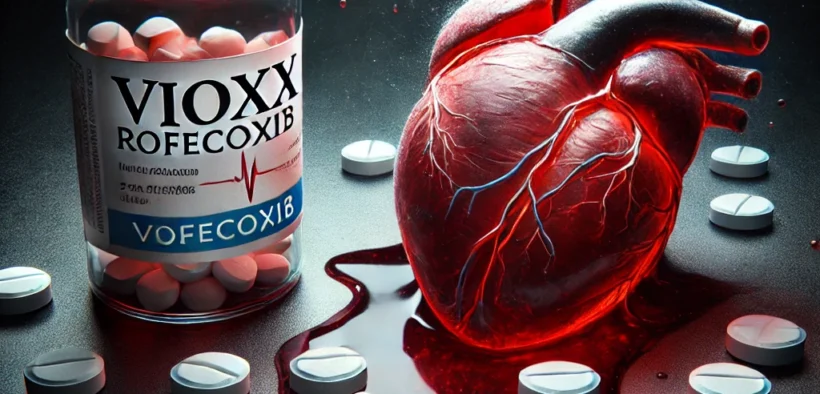The Vioxx (Rofecoxib) Scandal: Why It Was Banned, Its Fatal Side Effects, and Global Lawsuits
Share

Story Highlights:
- Vioxx (Rofecoxib) was initially marketed as a safer alternative to traditional NSAIDs for pain relief, especially in arthritis patients.
- The drug was linked to heart attacks and strokes, causing an estimated 38,000 to 60,000 deaths globally.
- It was available in over 80 countries before being withdrawn in 2004.
- A massive wave of lawsuits followed, with Merck agreeing to pay $4.85 billion to settle legal claims.
- The drug’s selective inhibition of the COX-2 enzyme was the key factor that led to fatal cardiovascular side effects.
Introduction: Why Vioxx (Rofecoxib) Was Banned
Vioxx (Rofecoxib) was a prescription painkiller developed by Merck and approved by the U.S. Food and Drug Administration (FDA) in 1999. It was marketed as a safer alternative to traditional non-steroidal anti-inflammatory drugs (NSAIDs), such as ibuprofen, especially for patients with chronic pain conditions like arthritis. The drug’s ability to relieve pain while supposedly avoiding gastrointestinal issues made it incredibly popular. However, what started as a promising treatment quickly turned into one of the largest pharmaceutical disasters in history.
In 2004, Vioxx was banned worldwide after it was revealed that the drug significantly increased the risk of heart attacks and strokes, leading to the deaths of thousands of patients. Merck faced global scrutiny, lawsuits, and regulatory backlash for its handling of the drug’s safety data.
Why Vioxx (Rofecoxib) Was Initially Considered Safe
Vioxx works by selectively inhibiting the COX-2 enzyme, which is responsible for pain and inflammation. Traditional NSAIDs inhibit both COX-1 and COX-2 enzymes, but COX-1 is essential for protecting the stomach lining. By only blocking COX-2, Vioxx was thought to avoid the gastrointestinal risks associated with NSAIDs, such as stomach ulcers and bleeding.
This selective inhibition of COX-2 appeared to make the drug a safer long-term solution for people suffering from conditions like osteoarthritis and rheumatoid arthritis. The initial clinical trials and short-term studies focused on pain relief and the drug’s gastrointestinal safety, overlooking the longer-term cardiovascular risks. As a result, the drug was approved by the FDA and regulatory agencies worldwide, and by 2004, Vioxx was being sold in over 80 countries.
How Many People Got Killed from Vioxx (Rofecoxib)?
It wasn’t until after the drug had been widely used that its dangers became evident. Studies and real-world data showed that Vioxx users had a significantly higher risk of cardiovascular events, particularly heart attacks and strokes. By the time Vioxx was pulled from the market in September 2004, it is estimated that between 38,000 and 60,000 people had died due to complications associated with the drug.
These fatalities were linked to Vioxx’s disruption of the body’s natural balance between clotting and blood vessel dilation, which increased the likelihood of blood clots forming. These clots could lead to deadly heart attacks and strokes, especially in long-term users of the drug.
Side Effects of Vioxx (Rofecoxib)
While Vioxx was effective in reducing pain, its long-term side effects were severe, particularly for patients with underlying cardiovascular issues. The most notable side effects included:
- Heart Attacks: Vioxx increased the likelihood of myocardial infarctions (heart attacks) due to the disruption in the balance of prostacyclins, substances that prevent blood clots.
- Strokes: The drug was also linked to a higher incidence of ischemic strokes, which occur when blood clots block the flow of blood to the brain.
- Hypertension: Many Vioxx users experienced elevated blood pressure.
- Fluid Retention: Some patients reported edema (swelling due to fluid retention), a common problem with NSAIDs.
- Gastrointestinal Issues: Although Vioxx was designed to reduce stomach problems, some patients still reported gastrointestinal side effects like nausea and diarrhea, though at a lower rate than with traditional NSAIDs.
The Composition Problem: Why Vioxx Was Deadly
Vioxx’s selectivity for the COX-2 enzyme was a double-edged sword. While it protected the stomach, it also reduced the production of prostacyclin, a compound that normally helps dilate blood vessels and prevent blood clots. When prostacyclin levels dropped, patients became more prone to clot formation, increasing the risk of heart attacks and strokes.
Inhibiting COX-2 without affecting COX-1 created an imbalance in the body’s natural mechanisms that regulate blood clotting. This was particularly dangerous for patients who were already at risk of cardiovascular diseases or who took the drug for extended periods.

Lawsuit and Global Impact: Vioxx (Rofecoxib) in Over 80 Countries
The global impact of Vioxx was staggering. The drug was sold in over 80 countries, including the United States, Canada, Australia, Japan, and various European and Latin American nations. As the cardiovascular risks became clear, countries around the world followed the lead of the U.S. in withdrawing Vioxx from their markets.
Thousands of lawsuits were filed against Merck. Patients and their families sought compensation for the harm caused by the drug. In the United States alone, more than 27,000 lawsuits were filed. After years of litigation, Merck agreed to a $4.85 billion settlement in 2007 to resolve most of the legal claims related to Vioxx.
In addition to the financial settlements, the Vioxx scandal prompted stricter regulatory oversight and post-market surveillance of drugs worldwide. Regulatory agencies like the FDA and the European Medicines Agency (EMA) faced intense scrutiny for how the drug was approved and monitored.
Conclusion
The Vioxx (Rofecoxib) scandal remains one of the most significant pharmaceutical disasters in history. It exposed flaws in the drug approval process, particularly in how long-term side effects are studied and communicated to the public. While the drug was initially seen as a safer alternative to traditional NSAIDs, its selective COX-2 inhibition caused deadly cardiovascular side effects, leading to the deaths of tens of thousands of people.
Ultimately, the global lawsuits and settlements, combined with the regulatory changes that followed, have ensured that the lessons learned from Vioxx continue to shape the pharmaceutical industry and safeguard patient health.






